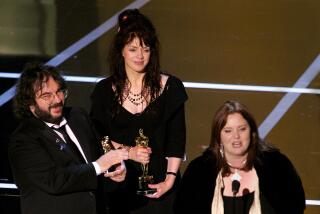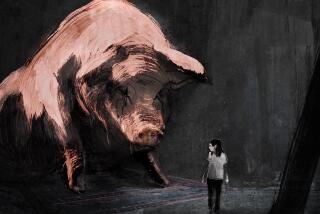An epic kids’ rhyme from ‘Hunger Games’ director Gary Ross
It began as a favor. It became an obsession.
It was 1996 and screenwriter Gary Ross got a call from a desperate friend. Out of time and money, director David Koepp was in frantic need of a children’s story to complete his movie feature debut, “The Trigger Effect.” Acquiring the rights to a known book was out of the question, so Koepp threw a Hail Mary pass to his friend: Write the beginnings of a story about a boy named Bartholomew Biddle, by tomorrow, for free.
“How could I possibly say no?,” Ross says with a laugh.
“I picked him because he’s a great writer and I was stuck,” recalls Koepp.
Ross did the writing, Elisabeth Shue read the words and a children’s literature career was born. It took only 15 additional years for the story to become more than the solution to a movie crisis.
This week, Ross, best known for his recent work as the director of “The Hunger Games,” released “Bartholomew Biddle and the Very Big Wind,” a 92-page story written in a Seussian-like rhyme about a boy and a bedsheet. Filled with adventure and intrigue, the story geared toward the 6 and older crowd is at once a whimsical tale of what kids today call YOLO (you only live once) and a poignant meditation on what it means to become an adult.
Kirkus Review calls it “a witty verse novella,” while Publishers Weekly says it’s a “fast-moving story about the potential for greatness within every child.”
Over the years, Ross would tinker with his few pages of text, adding another couple stanzas during long airplane rides or while on vacation. He wrote one chapter about 10-year-old Bart’s stay with some oddly polite pirates while he was on a ski trip to Utah when his children were young.
During his work on the animated film “The Tales of Despereaux” in 2008, he met the publishers at Candlewick Press. He showed them his work in progress and they agreed to publish the story. Ross spent the next year and a half working in earnest on his epic rhyme.
The story revisits a favorite theme of Ross’. Whether it’s his “Big” screenplay, his directorial debut, “Pleasantville,” or his recent work on “The Hunger Games,” the father of 16-year-old twins is routinely preoccupied with the concept of growing up.
“I’m going to do it until I learn how,” joked Ross, a three-time Oscar-nominated screenwriter.
“I think we are drawn to certain things on an unconscious level. [This book] is about growth and evolution, and it’s obviously something I’m interested in. I find it poignant, I find it moving — the struggle to grow and be free and break free and be your own person. I find it the most fundamental human struggle.”
“The Very Big Wind” takes Bart from a land of well-behaved pirates to a world of gray drudgery, where men tread to work in their dull uniforms, only to return home in the same dreary condition.
“Row after row of the same little yards,/ the same little fences, the same little cars — / even the trees grew in long rows of ten./They stood single file, and so did the men/ who stood at the station, their eyes towards the ground. Bartholomew thought, ‘What a sad little town.’”
The book’s climax takes place in a deep canyon — a vast cavern where dreamers, climbers, Girl Scouts and even Amelia Earhart lose their conviction and give up.
Ross is working on another project involving the topic of growing up, with perhaps the most famous of characters trapped in arrested development: Peter Pan. Ross, who bowed out of continuing “The Hunger Games” series despite the success of the first film, has chosen to adapt Dave Barry’s Peter Pan prequel, “Peter and the Starcatchers.”
Ross’ book effort has spanned his own children’s transformation into adulthood, a fact not lost on him as he gets ready to send them off to college.
“We know that the best kind of parent you can be is one that lets their kids discover their own freedom and not need you,” said Ross. “That’s the beautiful and sad thing about being a parent. If we do our job perfectly, they leave.”
More to Read
Sign up for our Book Club newsletter
Get the latest news, events and more from the Los Angeles Times Book Club, and help us get L.A. reading and talking.
You may occasionally receive promotional content from the Los Angeles Times.






